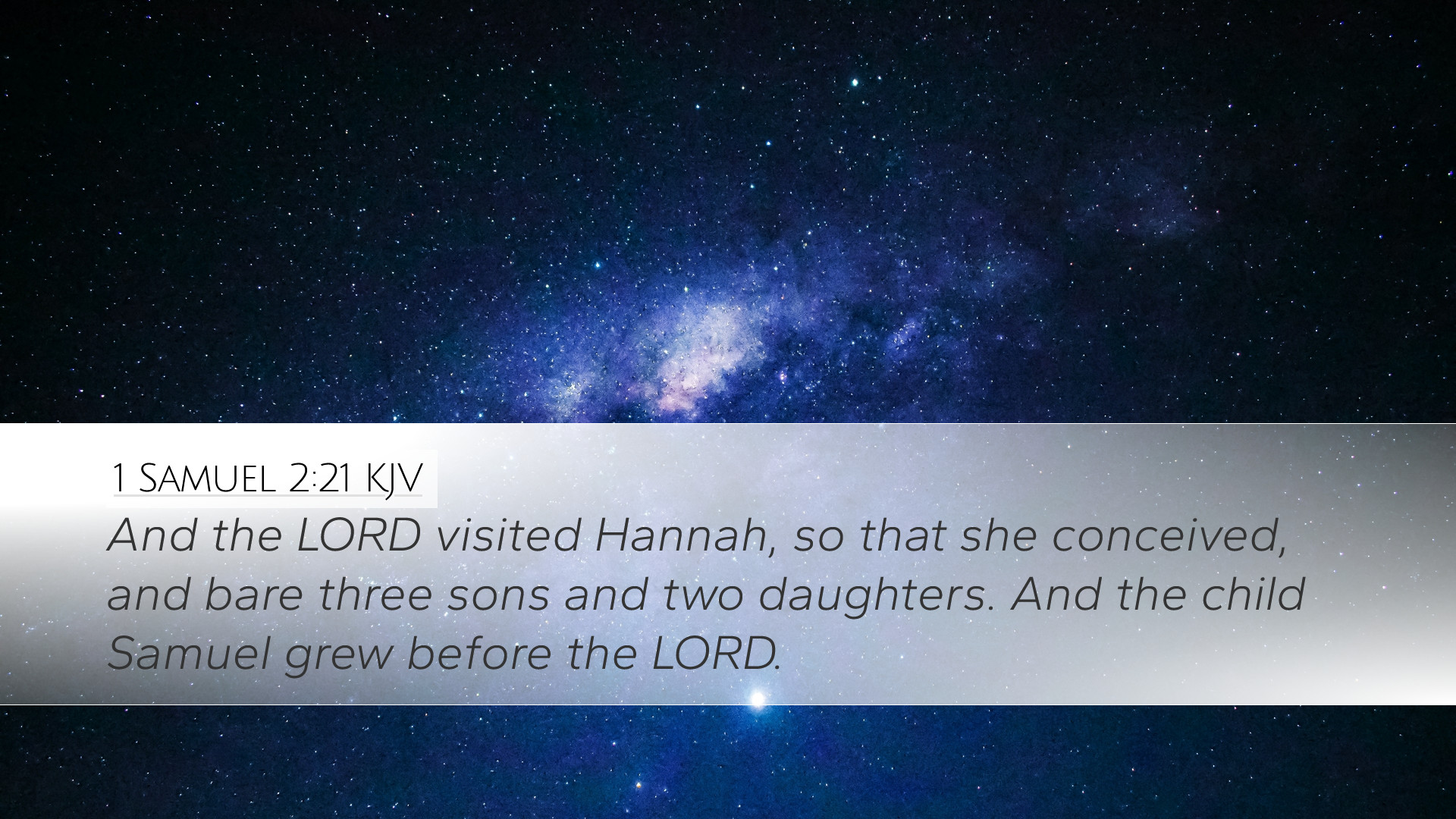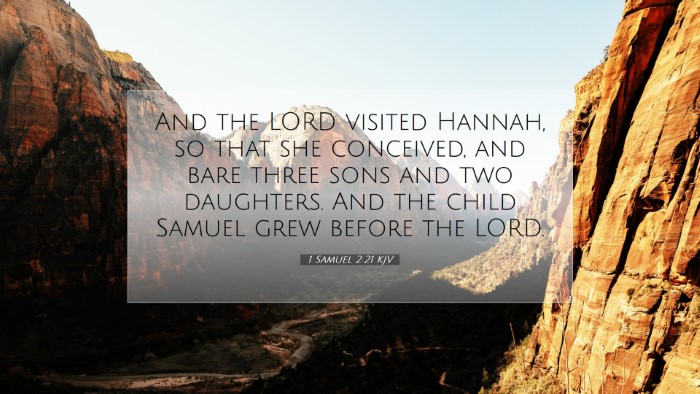Commentary on 1 Samuel 2:21
Verse Reference: 1 Samuel 2:21 - "And the Lord visited Hannah, so that she conceived, and bare three sons and two daughters. And the child Samuel grew before the Lord."
Overview
This verse encapsulates an important moment in the narrative of the early life of Samuel, a pivotal figure in Israel’s history. It highlights both the fulfillment of Hannah’s prayers and the growth of Samuel in the presence of God. The verse serves as a remarkable testament to divine intervention and blessing, particularly in a context of personal distress and societal needs.
Contextual Background
The story of Hannah, situated within the larger narrative of the Book of 1 Samuel, provides profound insights into themes of faith, devotion, and God’s sovereignty. Hannah, troubled by her barrenness, fervently prayed for a child, illustrating the deep longing and cultural significance of motherhood in ancient Israel. God’s response to her plea not only addresses her personal suffering but also contributes to the broader divine narrative of Israel’s leadership and prophetic voice through Samuel.
Theological Insights
- God’s Faithfulness: The mention of God's visitation signifies His attention to the prayers of His people. This reflects the broader biblical theme of God's faithfulness to fulfill His promises, reminding us that God’s timing may differ from our own.
- Divine Blessings: Hannah’s resulting children were not merely a personal blessing, but they also signified God's favor towards her in fulfilling the covenant relationship. As Matthew Henry notes, “Those whom God blesses with children should dedicate them to Him in a special way.”
- Growth of Samuel: The phrase "the child Samuel grew before the Lord" emphasizes Samuel’s formative years in a godly environment, signifying the importance of spiritual upbringing, which is crucial for anyone involved in ministry or spiritual leadership.
Commentary from Matthew Henry
Matthew Henry reflects on the significance of God's providential care over Hannah. He interprets her blessings not only as individual triumph but also as part of God’s larger plan for Israel. Henry notes that “when we see God's grace in our families, it is a call to us to dedicate those gifts, much like Hannah did with Samuel.” This act of dedication becomes pivotal in understanding the weight of Samuel's future role as a prophet.
Insights from Albert Barnes
Albert Barnes provides a contemplative approach, emphasizing God’s purpose in granting Hannah's request. He observes, "The Lord visited Hannah" implies an active engagement of God in human affairs, underscoring God's power to intervene in seemingly impossible situations. Furthermore, Barnes draws attention to the orderly fashion of God’s blessings; Hannah not only bore many children after Samuel but shows a divine pattern of prosperity for those who trust in the Lord.
Reflections by Adam Clarke
Adam Clarke elucidates on the profound implications of this verse, particularly considering the cultural context of women in ancient societies. He points out that God’s provision for Hannah was revolutionary, restoring her dignity and social status. He urges modern readers to recognize that God is always attentive to the cries of the needy and the distressed, reinforcing the active role of prayer in the believer's life.
Practical Applications
- Prayer and Dedication: This verse encourages believers to approach God in sincerity with their needs, reaffirming that God listens to heartfelt prayers. It also serves as a challenge to dedicate our blessings back to God and make them instruments for His glory.
- God's Timing: Hannah's experience teaches that divine timing is often beyond human understanding. Pastors and theologians can emphasize patience in prayer, trusting that God's answers may come in forms and times we do not anticipate.
- The Importance of Nurture: As Samuel grew in the presence of the Lord, so should leaders today emphasize the cultivation of future generations in faith. The potential of young believers should not be underestimated; like Samuel, they can be raised into significant roles within the church and society.
Conclusion
1 Samuel 2:21 serves not only as an account of Hannah's blessing but as a profound statement about God's faithfulness, the importance of dedicated parenting, and the nurturing of our faith. Pastors and theologians are reminded to draw upon this text as an encouragement to those who may be struggling with their situations, affirming that God is attentive to their plight and capable of transformative acts of grace.


